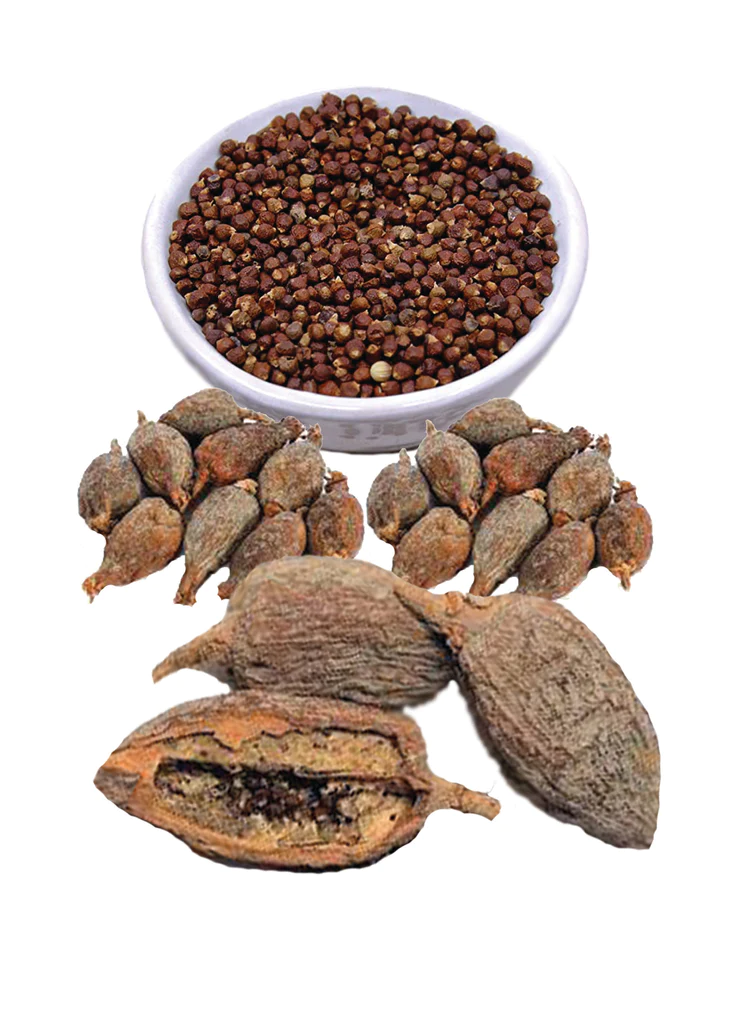
Alligator Pepper is a West African edible spicy fruit in form of small seeds covered in pods. It is most popularly used in seasoning foods because of its peppery taste.
In the eastern part of Nigeria, kola nuts are served alongside Alligator Pepper and alcohol to entertain visitors.
Also, it goes without saying that, Alligator Pepper are also popularly used in traditional medicine to treat a wide range of health issues. And modern science has started to prove some of its powerful health benefits.
FAQ About Alligator Pepper
Here are some of the frequently asked questions about Alligator Pepper and their brief answers:
· What Is Local Name for Alligator Pepper In Nigeria?
Alligator Pepper is called Atare in the Yoruba language, ósè ọ́jị́ in the Igbo language, and Chitta in the Hausa language.
· Why is it called alligator pepper?
It is called Alligator pepper because of bumps on the seeds looks like that of an alligator’s back.
· Does alligator pepper cure infection?
The extract of the seed of Alligator pepper has long been used traditionally to prevent and cure infectious diseases, and also the treatment of wounds.
· Can alligator pepper terminate pregnancy?
Alligator pepper has been used to terminate pregnancy in traditional medicine. More modern research is needed to confirm its safety and effectiveness.
· Does alligator pepper boost sperm?
Research studies have shown that Alligator pepper can help men suffering from premature ejaculation by improving sperm and semen. Also, studies show that Alligator pepper has aphrodisiac properties.
· How do you eat alligator peppers?
Alligator pepper is eaten with kola nut in the eastern part of Nigeria. And it is commonly used spice in making pepper soup
· Do alligator peppers reduce prolactin?
A study revealed a significant drop in Prolactin in non-lactating rats treated with Alligator pepper seed.
· Is alligator pepper good for high blood pressure?
A research study showed that Alligator pepper seed had a great influence on blood pressure in both hypertensive and non-hypertensive people.
Uses Of Alligator Pepper
Alligator pepper has a lot of culinary and spiritual uses.
Some of the culinary uses of Alligator pepper includes using it as a spice to spice up foods like chicken, lamb, cake. And using it flavouring in alcoholic drinks like beer, ale and gin.
Also, alligator pepper is commonly used for spiritual jobs like protection from evil attacks, guns and poison. And also for the treatment of physical and spiritual diseases.
Health Benefits Of Alligator Pepper
Here are some of the potential health benefits of using alligator pepper
1. Weight Loss
Some research studies show that alligator pepper can help in fat loss and in boosting metabolism.
For example, a randomised controlled study on 19 non-obese women who were given a daily dose of alligator pepper lost some body fat
Another study on 19 healthy young men given Alligator pepper showed an increase in energy expended AKA metabolism
2. May help Remedy Erectile dysfunction
Alligator pepper has long been regarded as an aphrodisiac in traditional medicine.
A modern scientific study showed that alligator pepper may help inhibit enzymes that might contribute to erectile dysfunction
3. May help boost testosterone
Some animal studies have shown Alligator pepper to help boost testosterone. Like a study done on rat given alligator pepper saw a significant increase in T levels [4]
That said, more human trial is needed to ascertain alligator pepper’s testosterone-boosting effect on humans.
4. Anti-diabetes property
West African Medicine has long used Alligator pepper for managing diabetes.
And modern scientific studies show that alligator pepper helps in increasing insulin production in hypoinsulinemic animals.
5. Anti-poison properties
Scientists suspect that Alligator pepper may contain anti-poison properties due to its antioxidant content, which can suppress inflammatory responses.
A study carried out on rats found out that rats that were given Alligator pepper were protected from a common research liver poison, carbon tetrachloride [5]
5. Antibacterial property
Compounds in Alligator pepper extract (like phenolic and diterpenes) has been scientifically shown to inhibit the growth of a wide range of bacteria like Staphylococcus aureus, Listeria monocytogenes, Klebsiella pneumonia, Escherichia coli, and so on.
6. Help treat skin infections
Due to Alligator pepper’s anti-bacterial action, it is widely used to treat various skin infections like chickenpox, measles and smallpox [6]
7. Treatment of stomach & intestinal issues
Alligator pepper extract is potent in taking care of a range of gastrointestinal problems like bloating, constipation, ulcer, and stomach pain. It also aids food digestion.
8. Treatment of wound
The high quantity of tannin found in Alligator pepper makes it an excellent wound healer. It is effective in not just healing wounds but treating burns too.
9. Analgesic properties
Alligator pepper extract is analgesic in nature which can be quite useful in relieving all sorts of pains including toothache, joint pain, rheumatoid pain and so on.
10. Aphrodisiac properties
Studies have shown that alligator pepper is a potent aphrodisiac in both males and females.
Caution & Side Effect Of Alligator Pepper
Generally, alligator pepper taken in food quantity or as a dietary supplement is likely safe because it’s usually in a mild dose.
However, in high doses is another story. A report revealed that healthy Igbo men who took 350mg of Alligator pepper seed (5-7mg/Kg body weight) suffered from diplopia and blurred vision.
Other recorded side effects of Alligator pepper are Irritation of the stomach, intestine and urinary system.
Finally, it is advisable that pregnant and breastfeeding women should stay away from these seeds to be on the safer side or contact a doctor before using them
Conclusion
Alligator pepper shows promise in helping out with various health issues. However, a lot of its benefits have little to no research studies to back them up. So, it should not be used as a substitute for treating any diseases or medical conditions, see your doctor instead.














